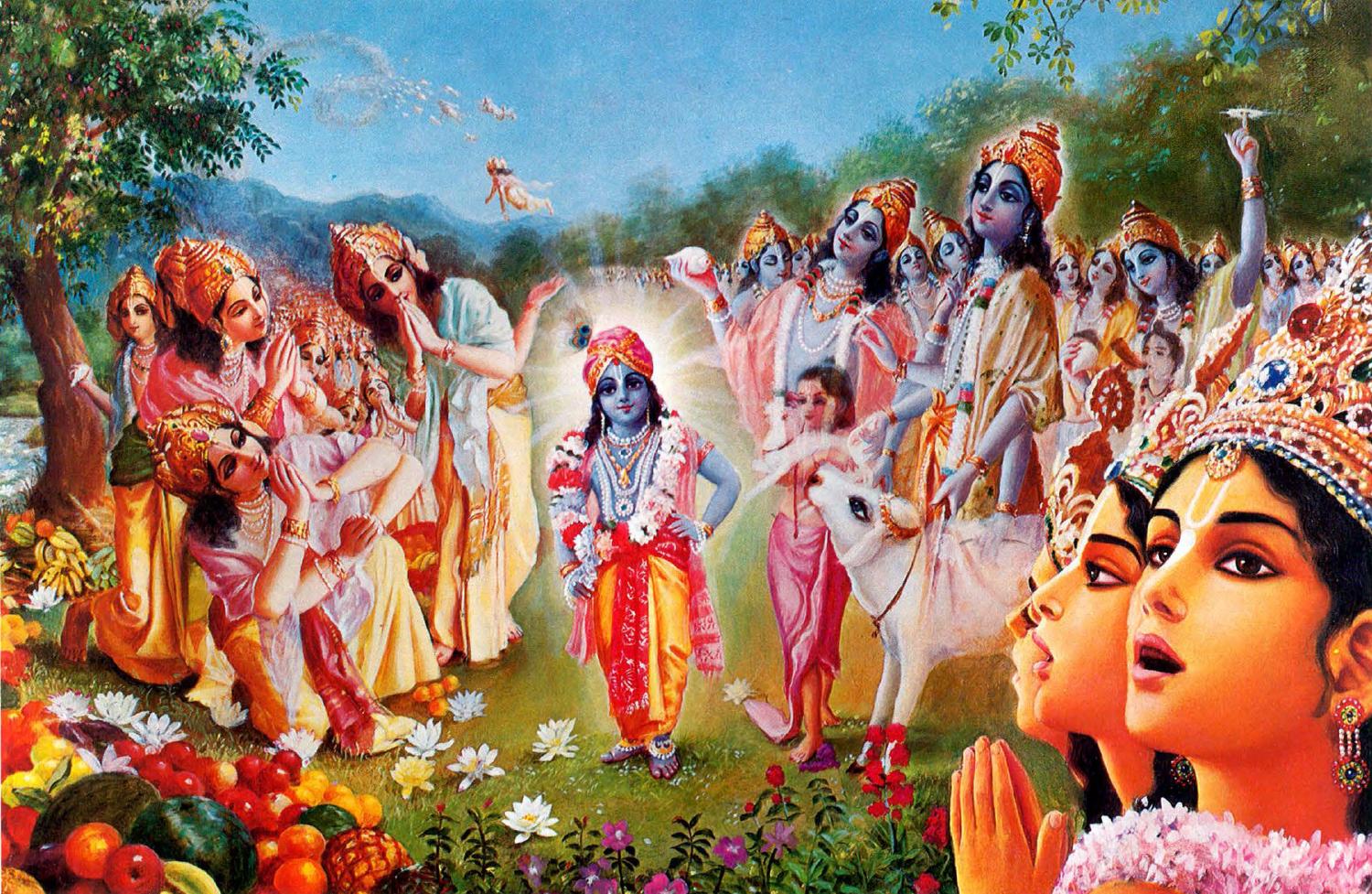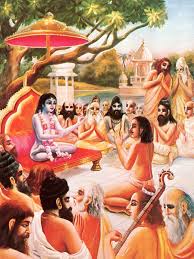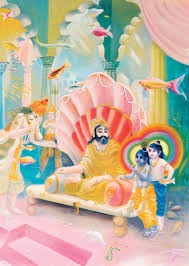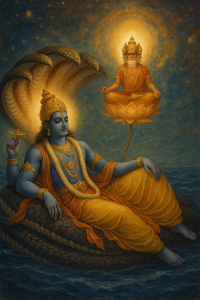The Daily Bliss of Vṛndāvana
Every day in the sacred land of Vṛndāvana, Kṛṣṇa, along with Balarāma and His cowherd friends, would take the calves out to graze, playing in the forests, climbing trees, dancing with peacocks, swimming in Yamunā, and relishing the sweetness of each other’s love.
Their simple laughter, the sound of flutes, and the rustling of leaves became the symphony of the spiritual world. For the residents of Vraja, there was no higher happiness than to behold Kṛṣṇa’s childhood pastimes, especially as He played with the calves.
Lord Brahmā’s Curiosity
Far away in Brahmaloka, the celestial creator Lord Brahmā heard of these divine sports. Though he was the first born of the universe and a great devotee of the Lord, a slight pride entered his heart:
“How can this little boy of Vṛndāvana be the Supreme Lord? He herds calves and eats food with cowherd boys!”
To test the reality of what was happening on Earth, Brahmā decided to perform an extraordinary experiment.
Brahmā Steals the Boys and Calves
One morning, as Kṛṣṇa and His friends were peacefully enjoying their picnic, Brahmā descended invisibly from the sky. In a moment, he kidnapped all the cowherd boys and calves, hiding them in a cave with his mystical power.
When Kṛṣṇa returned from gathering firewood, He saw that all His companions and calves had vanished. Though the Supreme Lord is never bewildered, He acted as though puzzled for the sake of līlā.
Understanding the mischief of Brahmā, Kṛṣṇa smiled to Himself and decided to protect the love of the residents of Vraja in a most extraordinary way.
Kṛṣṇa Expands Himself
Without hesitation, Kṛṣṇa expanded His own form into identical replicas of every single calf and cowherd boy.
Each duplicate was indistinguishable in every detail—voice, behavior, mannerisms, clothes, laughter, and even individual relationships. These expansions returned home with the cows, entering the hearts of the mothers, fathers, and families of Vraja.
Unprecedented Parental Affection
What followed was a miracle of love: the mothers and fathers of Vraja, including Yaśodā and Nanda, felt an unusual surge of affection for their sons and calves.
Even the cows began licking their calves more than ever. The parents felt, “Today my son seems so special, so dear, so divine.”
This divine pastime continued not just for a day, but for one full year, as per human calculation.
Brahmā Returns – and Is Humbled
After what seemed like a moment in his own time, Brahmā returned to see what had become of his trick.
To his astonishment, he saw Kṛṣṇa still playing joyfully with the same cowherd boys and calves, laughing and eating as before.
Bewildered, Brahmā returned to the cave—and found the original boys and calves sleeping under his spell.
Now realizing his cosmic illusion had been shattered, Brahmā saw countless universes within Kṛṣṇa’s body, each filled with Brahmās, Viṣṇus, and infinite creations.
He fell to the ground in reverence, shedding tears of repentance.
Brahmā’s Prayers and Kṛṣṇa’s Compassion
With folded hands, Brahmā prayed:
“O Lord, I am but a speck before Your infinite power. You are the master of all, yet You play as a cowherd boy, hiding Your greatness behind divine simplicity. Forgive my arrogance and bless me with devotion.”
Kṛṣṇa, full of compassion, simply smiled. He did not chastise Brahmā, for He is always merciful to His devotees—even when they err.
Kṛṣṇa then withdrew His expansions and restored the original cowherd boys and calves, who continued their play as if nothing had happened, unaware of the year-long divine miracle that had transpired.
Lessons to Be Learned:
- The Lord’s form is limitless; He can expand Himself into countless forms to please His devotees.
- Even the greatest demigods, like Brahmā, can become bewildered by the Lord’s humanlike pastimes.
- Kṛṣṇa’s mercy surpasses justice—even when tested or doubted, He responds with compassion, not anger.
- The love of the Vrajavāsīs for Kṛṣṇa is so pure that the Lord Himself expands to preserve their loving relationships.
- True spiritual realization is not in power or position, but in humble surrender and bhakti.
Origin of the Story: Harivaṁśa Purāṇa – Viṣṇu-parva, Chapters 35–40



